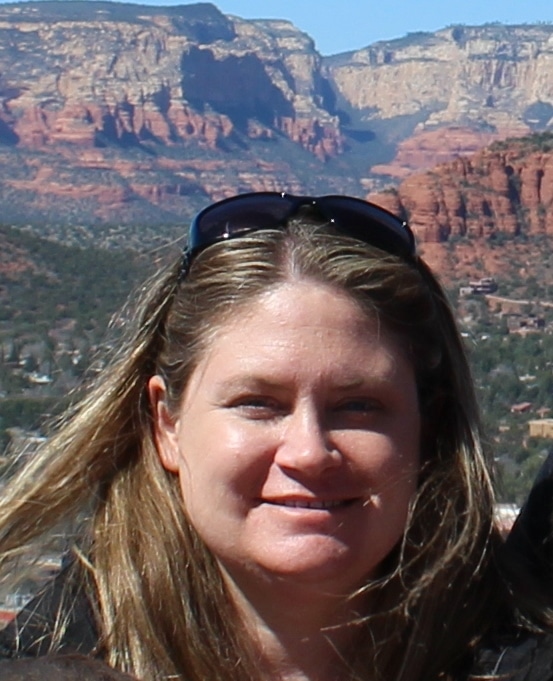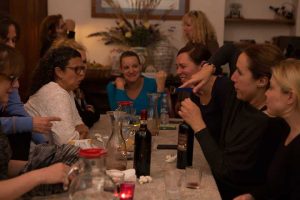By Julie Hoag
“I can do it myself,” I said, I was mad, insistent I do it all on my own.
I wasn’t going to let her fix this for me. I yanked hard to loosen my backpack to free it from a metal bar under my seat when my mom dropped us off at school that day in December. My thirteen-year old sister got out of the back seat, I got out of the front passenger seat. That was the last time I saw my mom alive.
We had tried to start my car before going to school, but I flooded the old black station wagon and it wouldn’t start. I wanted to take the new white station wagon and drive myself and my sister to school, but my mom needed it for the day. I was sixteen and I admit it, I was a brat. I wanted to drive myself, and not be driven by my mom. I could drive and I had a car, I never rode the bus and being driven by my mom embarrassed me.
We went to school, clueless to what horrors would come later in the day. I went through my day oblivious to others because I had the worst problem: my mom was sick. She had been losing weight and spent hours on the phone talking to friends. She saw untruths like my dad looked older and skinnier when he looked the same to me. She was different, not my dad.
My mother had become obsessed, and bought bags of food to sustain us. We had paper bags filled to the brim like tulips, she had a fear that the bankruptcy would render us homeless, and she wanted to be prepared. The bags contained foods that wouldn’t spoil like soup cans, macaroni and cheese boxes, jars of sauce and pasta. My mom had been going through a depression due to house building business that went sour. My mom and my dad, my aunt and my uncle, had started this joint venture and it failed, miserably. My parents were overwhelmed and my dad didn’t realize what he had signed, but the bottom line was that my parents owed money to a bunch of people and they didn’t have it
My mother’s guilt was tremendous. Her nature was so giving and generous she was unable to fathom how she made this mess for our family which resulted in the filing for bankruptcy. All she understood was, that in her brain, it was all her fault. The guilt ate away at her and destroyed her appetite so she lost more weight and she couldn’t sleep. She began to see a typical therapist, but that didn’t help. Then she tried a religious therapist who wanted to meet with us to discuss our mom. My dad and my sister and I sat in the therapist’s kitchen at her square table surrounded by hanging plants and we insisted we had nothing to talk about because we didn’t blame her. We didn’t think it was her fault. It was us who needed to help her, not the therapist, but we didn’t get it. She needed more than our verbal forgiveness but we didn’t know what to give her. It’s not like she wasn’t trying. She talked to friends for hours, she read self-help religious books, she even went on Prozac a few weeks prior to her death to try and help. She turned to reading the Bible. In hindsight, she was seeking help wherever she could.
My world shifted while I made peanut brittle in tenth grade chemistry. My table mates and I carefully measured out the ingredients into glass beakers. We stirred the mixture constantly over a burner and removed it from the heat at the precise right temperature. We poured the foamed mixture into the tin foil and waited for it to harden. Then we broke it into a dozen shards.
The peanut brittle was finished and divvied up, and we were almost done with fourth hour. Just a few short hours before school was to be out for Christmas break, I was called down to the office over the loudspeaker. I had stared down at the tin foil cradling the peanut brittle shards on the lab table before I left, and I wondered how strange and mysterious going down to the office was at this moment. I don’t know why, but time slowed down and the most important thing seemed to be memorizing the bumps on the shards of brittle before me. I knew I had to go. My sister came down shortly after me and I thought it was curious we were both called to the office.
We were ushered from the front desk into a room, the principal’s office; and in that small room with apple sculptures upon three shelves on the wall I saw our pastor, my dad, and a police officer. I felt frozen and mortified. No one had to tell me what had happened. No one had to say aloud that she was gone, I just knew it. I knew my mother was dead. I didn’t know how or why or the specifics, but it didn’t matter, she was gone.
We left with my dad and the snow fell in heavy flakes like it often does in Minnesota in December. We went home, home to where my mother had died hours earlier in that wretched black station wagon that hadn’t started for me just six short hours ago. She had died in the car, with the car door open. Maybe she had tried to start it because it wouldn’t start for me, maybe she wanted to prove it wrong and make it start, maybe she was so depressed and sleepy that she didn’t notice the garage door was down, or maybe, maybe it was something else altogether. She had started Prozac a few weeks prior, and she had insisted to close friends and her therapist that she didn’t want to die.
How did my mother die in a car that wouldn’t start for me? The carbon monoxide swallowed up my mother and she left us, she was gone.
My grandma had told us she called my mother earlier in the morning and my mother had said she was fine and that she had some errands to run, and then she’d be over to pick up my grandma. But Grandma waited and waited. At the top of the stairs was a note written by my mom that simply said she was so tired. My grandma wondered if she just tried the car and fell asleep. Perhaps she was just careless. Our cats were home and one of our cats had a cut on his back thigh, did he fall when he felt the effects of carbon monoxide? Was he hurt another way? We watched our cats as they were sleepy and slow moving. I felt just like them.
The house was cold and the windows and doors were wide open to air it out, to replace the bad air with good outside air. The Christmas tree boughs shook slightly from the window wind and the gifts felt the cold Minnesota winter barge in, but it wasn’t safe for us to stay. We were to spend the night at my aunt and uncle’s house. Our cats would have to stay because they weren’t allowed at the house. My dad had said, “The cats have to stay.” The police nodded in agreement. I didn’t want them to stay in that carbon monoxide filled house, I didn’t want to lose them as well.
All I remember of that night is hugging my dad and sister in the basement of my aunt and uncle’s house. We were supposed to be home with our mother, and our cats. We were supposed to be getting ready for Christmas.
My mother, my sister, and I always made cookies this time of year. We made peanut butter cookies with the chocolate kiss, the cut out cookies we decorated with sprinkles red, green, blue, and yellow frosting, the gingerbread men with frosting faces and buttons and pants with wavy frosting cuffs. The caramels spread flat on the cookie sheet and put out on the deck to harden in the cold air. My mother would take the pan and cut rectangle caramels for us to wrap up in wax paper pieces. The braided Finnish Pulla bread she’d make for my dad for him to reminisce about his Finnish mother making it at Christmas when he was a boy. She would roll the dough into long strands and braid it and bake it, he said. It was always a good time of year, but this year we had to wake up in different beds, we had a funeral to go to.
At the funeral, our pastor asked us what we remembered most about our mom, I said, “she could do everything.” And she could. She was so generous, so loving, so hard working, and she had a smile for everyone she met. Yet she was inspired by me and my young joy. In her depression she tried to emulate me, peeking around a corner and being silly like a kid. I was taken aback by it and she just simply said she was trying to be like me. She asked me how I did it, how did I have joy. I shrugged it off at the time. I didn’t have an answer then. It’s a bittersweet memory for me as now I am 42, just three years short of the age she died at age 45. I think to myself how I don’t want to die in three years and leave my own three boys to flail in the wind without a mom as I did. Leaving them to finish growing up without me is my greatest fear.
Now I go to her cemetery grave stone with my children. I know she isn’t there but it’s the best way I know to make her more real for them. I want her to be known and celebrated. She deserves to be known and celebrated.
When people ask how she died I say she died in a car. Her story is not one of questions surrounding her death, but about how she was a kind person who volunteered at church to wash communion glasses, a woman who gave to the poor and the less fortunate, and a mom who took us to dance lessons and Girl Scouts. She was a nurse and a wife and a daughter and a friend.
I fell into despair and became consumed by depression myself as a teenager after her death, I was that kid who depression fit inside of quite comfortably. I hurt deeply, daily, and severely. I was haunted by the fact that I never even said, I love you to her. I never got to tell her I wanted her there for my wedding, for the birth of my children, for my life.
I am still here and I survived. I became a mother myself and a new me was born out of that depression and that horrible life experience. Today when I leave my kids and my husband, even to just run an errand, I tell them I love them. I celebrate my mom by making her Christmas cookie recipes with my children.

Julie Hoag is a freelance writer and blogger. She has a background as a stay-at-home mom, as well as a pediatric nurse, and in science. She volunteers in her children’s schools and in her community. She loves to spend time with her husband, their three boys, their two rescue dogs, two guinea pigs, and a hamster. Julie can be found online here: Facebook, Twitter, Instagram and at juliehoagwriter



Julie, what a powerful story and a beautiful way to remember your mother by baking her Christmas cookie recipe each year, even though that was such a painful thought to you in your initial grief. You absolutely gripped me in my seat with your detailed description of the peanut brittle. What a terrible experience for you. I cannot imagine. My own mother silently battled depression for years and it still pains me to see the shame in her eyes when she talks about it. As if she were damaged goods that people would judge if they found out the truth of her past. 🙁 Thank you for your willingness and courage to share your story. Keep it up.
This spoke to my heart. Depression recently stole my brother. Thank you for reminding me to remember what he could do – he was so hand, could build anything. And he was so much fun. I miss him like crazy every single day of my life. I plan to do more things he loved with my kids too – that is so important. Hugs to you.
Thank you for sharing. I also lost my father to depression at a very young age. Glad your story turned out well despite the sadness in your story.
Thank you so much for sharing your story.. I have a family member with depression that has expanded into substance abuse issues… so I can def relate.
I love that you celebrate your mom. I am so sorry for your loss. Thank you for sharing this powerful personal story. My mother died of natural causes, but I completely relate to visiting her grave and making sure she is known and celebrated.
Oh Julie! My heart breaks reading this. It scares me a little because I, too, have struggled with depression. I do not ever want my family to go through what you went through. You. are. amazing! You are an inspiration to all who are trying to overcome such tragedy. Thank you for sharing your story. xo
Thank for your honesty and storytelling. Depression is a powerful thing, I know what you mean when you say as a kid, depression fit quite comfortably in you. It did in me as well. Still does in many ways. Certainly was something my mother also struggled with and shaped many of my childhood memories. Memories that have shaped a lot of my poetry and writing. Keep making Christmas cookies!
Thank you for sharing your heart. For being honest about the hardship of losing a parent. I appreciate that you emphasized that how she died is not important but how she lived is what should be remembered. My father died almost two years ago from a brain tumor, I want my daughter to know more than just how her grandpa died. I want her to know how he lived. Your story really blessed me. ❤️
This is heartbreaking but beautiful, such a tribute to your mom. Depression is a fierce and merciless disease, I’m so sorry how much it’s impacted you and your family
Thank you for sharing your story. Your honesty and remembering all the the things your mom did will help others going through the same. Hugs.